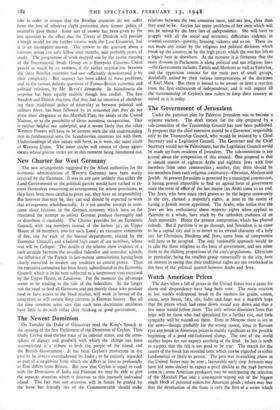Western Questions
The argument that Mr. Bevin's proposals for a Western Union were imprecise has proved in the past three weeks to be not so much wrong as superfluous. The original speech has precipitated a whole series of questions whose precision is positively stark. Already the first welcome from Belgium, Holland and Luxemburg for the idea that they should be more closely associated with Britain and France has been followed by questions. Will the new alliance mean that the Benelux countries will be consulted from now on about the economic policy in Germany with which their own prosperity is so closely' bound up? Just what is the attitude of the British Government to the French economic proposal for a Franco-Benelux customs union, and what is the French attitude to British proposals for closer political understanding implicit in the original speech? What military guarantees are Britain and France prepared to under- take in order to ensure that the Benelux countries do not suffer from the loss of whatever slight protection their former policy of neutrality gave them? Some sort of answer has been given to the last question to the effect that the Treaty of Dunkirk will provide a rough model for the further treaties with the Low Countries, but it is an incomplete answer. The answer to the question about a customs union can only follow after months, and probably years, of study. The programme of work mapped out by the recent meeting of the International Study Group on a European Customs Union proves as much by its vastness, if the .earlier negotiat:ons between the three Benelux countries had not sufficiently demonstrated it by their complexity. But urgency has been added to these problems, and to the various delicate questions of Franco-British economic and political relations, by Mr. Bevin's demarche. In Scandinavia the response has been equally realistic though less cordial. The first Swedish and Danish reaction, that they had no intention of abandon- ing their traditional policy of neutrality as between political and military blocs, has been followed by an assurance that they do not abate their allegiance to the Marshall Plan, the ideals of the United Nations, or to the possibility of closer economic co-operation. This is neither helpful nor unhelpful, and it seems likely that the other Western Powers will have to be content with the old understanding that in fundamental aims the Scandinavian countries are with them. Understandings of this nature will form, as it were, the outer circle of Western Union. The inner circles will consist of closer agree- ments whose precise terms are at this moment being hammered out.



































 Previous page
Previous page